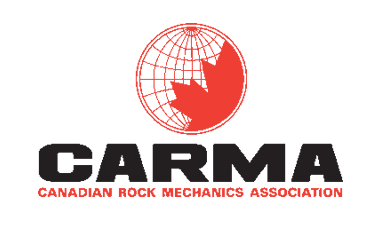WEBINAIRES
La Rock Engineering Society de l’ICM et la Division de mécanique des roches de CGS collaborent par l’intermédiaire de CARMA pour lancer une série de webinaires sur la mécanique des roches. Le premier événement a eu lieu le 29 septembre 2023.
| Date | Informations sur le webinaire | Présentation |
|---|---|---|
| 7 juin, 2024 | The Destressability Index for the Design of Large-Scale Confined Destress Blasts Dr. Patrick Andrieux Andrieux & Associates Geomechanics Consulting, Québec, Canada Synopsis: As extraction ratios increase and as mining progresses to greater depths higher stress magnitudes develop, which can lead to significant ground control challenges. Stresses can eventually reach levels that preclude safe mining operations. At that stage destressing can become an option. Destressing in this context can be defined as cutting the stress path “upstream” of reserves too highly stressed for safe mining, to divert the stress elsewhere and then mine in the stress shadow thus created. The webinar will address the following aspects: • The difference between preconditioning and destressing • The mechanics of destressing • The description of the empirical Destressability Index methodology used for the design of several destress blasts since 2005 • The presentation of an instrumented case study Short Bio: Patrick Andrieux is a mining engineer with forty years of experience at operating mine sites (both on surface and underground), as well as in research and development, instrumentation, technical services and support, and consulting. Patrick is currently Principal Engineer at A2GC, a Montreal-based Canadian consulting firm established in 2015, which offers technical services in the fields of geomechanics, ground control, mine design, numerical modelling, seismicity and drilling and blasting to local and international mining, construction and civil engineering clients. Since 2019 he is Adjunct Professor at Laval University in Quebec City in the Department of Mining, Metallurgical and Materials Engineering. Patrick is a Registered Professional Engineer in the Canadian provinces of Quebec and Ontario and in the Northwest Territories and Nunavut, as well as a Designated Consulting Engineer in the province of Ontario. |
Voir la vidéo de la présentation ici (en anglais) |
| 15 mars, 2024 | The Role of Rock Engineering in Hydroelectric Scheme from Design to Operation
Dr. Marco Quirion, PhD, ing. Hydro-Québec, Montréal, Québec, Canada Abstract: Hydro-Quebec owns and operates more than 60 hydroelectric powerhouses and out of this number, 8 are excavated underground. From 600 dams owned by Hydro-Québec, 190 are categorized as “large” dams under the ICOLD definition. The construction of all these hydroelectric schemes required large volume of rock excavations: Powerhouse caverns, surface powerhouse enclosure, spillway tailrace channels, unlined intake tunnels, access roads, to name a few. Also, for many sites, high natural rock slopes are present in the vicinity of the installations. These plants were built over many decades, going from the early 1930s up to the present day. Rock engineering is always present in the lifecycle of these hydroelectric schemes from the design phases, through construction, commissioning, and their safe operation. The goal of this webinar is to share Hydro-Quebec’s experience on the different aspects of rock engineering in the context of hydropower. Short Bio: Marco is a geological engineer with over 25 years of experience in rock engineering in the field of hydropower. He holds degrees in Geological Engineering from Université Laval and a PhD in Civil Engineering from the Université de Sherbrooke. From 2000 to 2005, Marco worked at Roctest Ltd. in geotechnical instrumentation before joining Hydro-Québec as a geological engineer specialized in rock mechanics. Marco is involved in the engineering of new hydroelectric schemes as well as in several studies of the behaviour of existing facilities presenting issues related to rock masses. He is a member of the ISRM Rock Grouting Committee and active in several evaluation committees for NSERC. |
Voir la vidéo de la présentation ici (en anglais) |
| 29 septembre, 2023 | Application of Systematic Point Load Testing to Characterization of Massive, Veined Orebodies Dr. Matthew E. Pierce (matt@pierce-engineering.com) Pierce Engineering, LLC Abstract: The large, deep orebodies now commonly exploited by caving mining methods are often sparsely jointed but contain complex networks of hairline defects, stockwork veins and sheeted veins of varying mineralogy and strength and significant variability in both the style and intensity of hydrothermal alteration. These features result in coefficients of variance in intact strength that often approach unity. Furthermore, there are multiple scales of variability in both intact and vein strength that complicate domaining and strength characterization, making it difficult to collect enough quality data to define the spatial variability in rock strength at scales relevant to mining. As a result, domaining is often conducted based on lithology plus alteration style/intensity, resulting in large domains with a significant intra-domain variation in rock quality. This talk describes how high density, systematic point load testing has been applied within characterization studies to address some of these challenges and provide a basis for more reliable forecasting of tunnel, pillar and cave performance. Short Bio: Matt is a geotechnical and mining engineer with over 25 years of experience in the geomechanical analysis and design of underground and open pit mines. He holds degrees in Geological Engineering and Mining Engineering from Queen’s University and a Ph.D. in Mining Engineering from the University of Queensland. Matt became an independent consultant in 2016 after 18 years with Itasca Consulting Group in Minneapolis and three years as co-director of the Rio Tinto Center for Underground Mine Construction in Sudbury. |
Télécharger la présentation ici |
